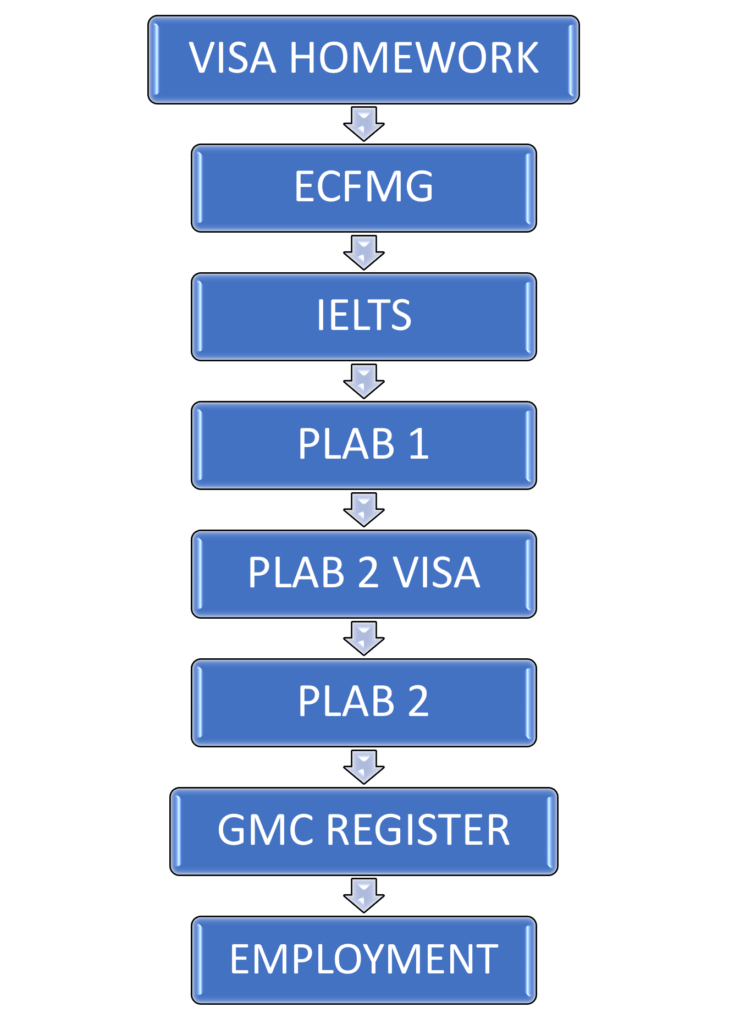PLAB exam guide step process- The Professional and Linguistic Assessments Board (PLAB) test is an assessment that overseas doctors need to pass to demonstrate that they have the necessary knowledge and skills to practice medicine in the UK. In this article, we will provide a comprehensive guide on how to pass the PLAB test.

PLAB Test Format-
PLAB test is a two-part assessment that evaluates a candidate’s medical knowledge and clinical skills. Part 1 is a computer-based test that consists of 180 multiple-choice questions. It is designed to assess the candidate’s ability to apply medical knowledge to clinical scenarios. The test is split into two sections, each lasting three hours, with a one-hour break in between. Candidates are allowed to take the test a maximum of four times.
PLAB test part 2 of the is a practical assessment that evaluates a candidate’s clinical skills. It consists of 18 scenarios, each lasting eight minutes, in which the candidate is required to demonstrate their ability to manage a clinical situation. The scenarios are designed to assess the candidate’s communication skills, ability to make clinical decisions, and ability to manage patients effectively. The assessment takes place at a test center in the UK, and candidates are allowed to take the test a maximum of four times.
Road Map for PLAB-

Is ECMFG required for PLAB?
No, the Educational Commission for Foreign Medical Graduates (ECFMG) certification is not required for PLAB.
ECFMG certification is a separate process for international medical graduates who wish to pursue postgraduate medical education or training programs in the United States. It is not a requirement for PLAB, which is an exam administered by the General Medical Council (GMC) in the United Kingdom for the purpose of assessing the medical knowledge and skills of international medical graduates who wish to practice medicine in the UK.
However, candidates who have obtained ECFMG certification may find it beneficial in their application for PLAB or other medical registration exams as it demonstrates their medical education and training background.
Is IELTS required for PLAB?
Yes, IELTS (International English Language Testing System) is a mandatory requirement for PLAB. The GMC requires all international medical graduates, including those who wish to take the PLAB exams, to demonstrate their English language proficiency by achieving a minimum score on the IELTS exam.
The minimum required score for IELTS may vary depending on the specific PLAB exam and the country where the candidate received their medical education. It is important for candidates to carefully review the GMC’s eligibility criteria and IELTS requirements before applying for the PLAB exams.
It is also worth noting that some candidates may be exempt from taking the IELTS exam if they have received their medical education in certain countries or if they have previously demonstrated their English language proficiency through another recognized exam. Candidates should check the GMC website for more information on IELTS exemptions and alternatives.
PLAB know the procedure for application–
Visit the General Medical Council (GMC) website-
The GMC is the governing body for medical registration in the UK, and they oversee the PLAB exam. You can visit their website to find information about the PLAB exam, including the application process.
Read the PLAB Candidate’s Guide –
The GMC has created a comprehensive guide for PLAB candidates that outlines the exam process, eligibility requirements, and application procedures. You can access the guide on the GMC website.
Check eligibility requirements –
Before applying for the PLAB exam, it’s important to ensure that you meet the eligibility requirements. These include having a primary medical qualification, being able to provide evidence of your English language proficiency, and having a valid ID document.
Apply for the exam –
Once you have checked your eligibility, you can apply for the PLAB exam through the GMC website. The application process typically involves providing personal information, paying the exam fee, and submitting any required documents.
Prepare for the exam –
After you have successfully applied for the PLAB exam, it’s important to begin preparing for the test. The exam consists of two parts: Part 1 is a computer-based test that assesses your knowledge and clinical skills, while Part 2 is a practical assessment that tests your ability to apply your knowledge and skills in a clinical setting.
Take the exam –
Once you are fully prepared, you can take the PLAB exam. Part 1 is typically held multiple times per year at test centers around the world, while Part 2 is held in the UK.
By following these steps, you can learn the procedure for application for the PLAB exam and take the first steps toward practicing medicine in the UK.
Exam Process-
- The PLAB exam is divided into two parts: Part 1 and Part 2.
- Part 1 is a computer-based test that assesses your knowledge and clinical skills. It consists of 180 multiple-choice questions that you must complete in 3 hours.
- Part 2 is a practical assessment that tests your ability to apply your knowledge and skills in a clinical setting. It consists of 18 scenarios that you must complete in 18 minutes each.
- You must pass both Part 1 and Part 2 of the exam to be eligible for registration with the General Medical Council (GMC) and to practice medicine in the UK.
Eligibility Requirements-
- You must have a primary medical qualification that is acceptable to the GMC.
- You must have completed 12 months of clinical practice after obtaining your medical degree.
- You must have passed an acceptable English language test, such as the International English Language Testing System (IELTS).
- You must have a valid ID document, such as a passport.
Application Procedures-
- Check your eligibility by reviewing the GMC’s eligibility criteria.
- Create a GMC Online account if you do not already have one.
- Submit your application for the PLAB exam through your GMC Online account.
- Pay the exam fee, which is currently £230 for Part 1 and £840 for Part 2.
- Wait for confirmation of your eligibility to take the exam.
- Prepare for the exam by reviewing the PLAB Candidate’s Guide, practicing sample questions, and studying medical textbooks.
- Take the exam at a designated test center.
- Receive your exam results within six weeks of taking the exam.
By following these outlines, you can understand the exam process, eligibility requirements, and application procedures for the PLAB exam, and take the necessary steps to practice medicine in the UK.
PLAB how many attempts to pass & minimum marks required to pass-
In the PLAB exam, there is no limit to the number of attempts you can make. However, you are only allowed a maximum of four attempts at the Part 1 exam, after which you need to apply for permission to take the exam again. There is no limit on the number of attempts for the Part 2 exam.
To pass the PLAB exam, you need to achieve a minimum score of 170 out of 200 in Part 1, and 112 out of 150 in Part 2. These minimum scores are subject to change, so it’s always best to check the GMC website for the latest information.
It’s important to note that while there is no limit to the number of attempts you can make, it’s best to take the time to prepare thoroughly before attempting the exam again. This will increase your chances of passing the exam and achieving your goal of practicing medicine in the UK.
PLAB-after passing PLAB Part 1, then after how much time required to attempt for Part 2-
After passing the PLAB Part 1 exam, you can apply to take the Part 2 exam immediately. There is no waiting period or minimum time requirement between the two exams. However, it’s recommended that you take some time to prepare for the Part 2 exam, as it covers a wide range of clinical skills and knowledge.
The GMC suggests that candidates should ideally aim to take the Part 2 exam within two years of passing the Part 1 exam. This is because medical knowledge and skills can deteriorate over time, and it’s important to keep them up-to-date for safe clinical practice.
Overall, the timing of when to take the PLAB Part 2 exam after passing Part 1 is ultimately up to the individual candidate and their own personal circumstances.
PLAB exam procedure-
The PLAB Part 1 exam is a computer-based test that is delivered online at designated testing centers. The exam consists of 180 multiple-choice questions and is divided into two three-hour sessions with a break in between.
The PLAB Part 2 exam, on the other hand, is a practical exam that assesses clinical skills and knowledge in simulated clinical scenarios. This exam is conducted in-person and requires candidates to travel to the UK to take the exam.
It’s important to note that due to the COVID-19 pandemic, there have been some changes to the PLAB exam format and delivery. The GMC has introduced a remote invigilation option for the PLAB Part 1 exam, allowing candidates to take the exam from the comfort of their own homes. However, this option is only available for a limited time and subject to certain eligibility criteria.
Candidates should always check the GMC website for the latest information on PLAB exam format and delivery.
PLAB-exam centers are though out the world-
The PLAB Part 1 exam is delivered at designated testing centers located throughout the world. The General Medical Council (GMC) has contracted with a testing company to administer the exam, and this company has established testing centers in various countries.
The PLAB Part 2 exam, however, is currently only offered in the United Kingdom. Candidates who pass the PLAB Part 1 exam and meet other eligibility requirements must travel to the UK to take the Part 2 exam.
It’s important to note that due to the COVID-19 pandemic, there have been some changes to the PLAB exam delivery and availability. Candidates should always check the GMC website for the latest information on PLAB exam centers and availability.
PLAB exam, including where to apply, how to apply, and related books to PLAB-
Where to Apply?
To apply for the PLAB exam, you need to create an account on the General Medical Council (GMC) website. The application process can be done entirely online through your GMC account.
How to Apply?
To apply for the PLAB exam, follow these steps:-
a. Check your eligibility for the exam by reviewing the GMC’s eligibility criteria.
b. Create a GMC Online account if you do not already have one.
c. Submit your application for the PLAB exam through your GMC Online account.
d. Pay the exam fee, which is currently £230 for Part 1 and £840 for Part 2.
e. Wait for confirmation of your eligibility to take the exam.
f. Prepare for the exam by reviewing the PLAB Candidate’s Guide, practicing sample questions, and studying medical textbooks.
g. Take the exam at a designated test center.
h. Receive your exam results within six weeks of taking the exam.
Related Books to PLAB–
There are several books available that can help you prepare for the PLAB exam. Some of the most popular ones include-
a. “PLAB: Extended Matching Questions” by Una Coales
b. “PLAB: 1000 Extended Matching Questions” by Sankalp Yadav
c. “PLAB: Part 1″ by Samson Daudu
d. “PLAB: 1700 MCQs” by Samson Daudu
e. “PLAB: 101 Tips to Pass” by Dr. Abhay Narayan Singh
In addition to these books, there are also online resources available, such as mock exams, question banks, and revision courses. The GMC website also provides a comprehensive list of resources and study materials to help you prepare for the exam.
By following these guidelines, you can successfully apply and prepare for the PLAB exam, and increase your chances of passing the exam and practicing medicine in the UK.
The PLAB exam is a medical licensing exam that is required for doctors who have qualified outside of the UK and wish to practice medicine in the UK.
To be eligible to take the PLAB exam, you must have a primary medical qualification that is acceptable to the General Medical Council (GMC). You must also have completed the necessary postgraduate clinical experience.
The application process for the PLAB exam involves completing an online application form and paying the necessary fees. You will also need to provide evidence of your qualifications and clinical experience.
The PLAB exam consists of two parts. Part 1 is a computer-based test that assesses your knowledge of medical science and clinical practice. Part 2 is a practical assessment that tests your ability to apply your knowledge and skills in a clinical setting.
There is no limit to the number of attempts allowed to pass the PLAB exam. However, candidates are advised to carefully consider their preparedness before attempting the exam again.
The minimum passing score for the PLAB exam is determined by the GMC and may vary from year to year.
There is no set time limit for attempting the PLAB Part 2 exam after passing Part 1. However, candidates are advised to attempt the Part 2 exam as soon as possible to maintain their knowledge and skills.
The PLAB Part 1 exam is delivered at designated testing centers located throughout the world. However, the PLAB Part 2 exam is currently only offered in the United Kingdom.
The PLAB Part 1 exam is a computer-based test that is conducted at testing centers. The PLAB Part 2 exam is an in-person practical assessment that is conducted in the UK.
There are many study materials available for the PLAB exam, including books, online courses, and practice tests. Candidates are advised to carefully review available study materials and select those that best fit their learning style and needs.
Which are the countries accept PLAB?
Certainly! Many countries recognize the PLAB exam as a means for foreign doctors to practice medicine in their jurisdiction. Here are some of the countries that accept PLAB–
- United Kingdom – The General Medical Council (GMC) of the UK oversees the PLAB exam and recognizes it as a way for foreign doctors to practice medicine in the UK.
- Bahrain – The Bahraini Ministry of Health recognizes PLAB as a way for foreign doctors to obtain a license to practice medicine in the country.
- Saudi Arabia – The Saudi Commission for Health Specialties recognizes the PLAB exam as a way for foreign doctors to practice medicine in the country.
- United Arab Emirates – The Dubai Health Authority recognizes PLAB as a means for foreign doctors to obtain a license to practice medicine in Dubai.
- Qatar – The Supreme Council of Health in Qatar recognizes PLAB as a way for foreign doctors to practice medicine in the country.
- Oman – The Ministry of Health in Oman recognizes PLAB as a way for foreign doctors to practice medicine in the country.
It’s worth noting that each country may have specific requirements for foreign doctors to practice medicine beyond passing the PLAB exam, such as completing additional training or obtaining a specific visa. It’s always a good idea to research the specific requirements of the country where you are interested in practicing medicine.
Conclusion
In conclusion, obtaining a PLAB certification is a great achievement for any aspiring medical professional. The exam process may seem daunting, but with the right preparation and determination, success is within reach. By meeting the eligibility requirements, following the application procedures, and utilizing the recommended resources, candidates can increase their chances of passing the exam and advancing in their medical career.
It is important to note that the PLAB exam is constantly evolving, and it is essential for candidates to stay updated on any changes to the exam format or eligibility criteria. Additionally, candidates should be aware of the minimum passing marks and number of attempts allowed to avoid any unnecessary setbacks in their career journey.
Ultimately, the PLAB exam is a crucial step towards practicing medicine in the UK and other countries that recognize this certification. With dedication and perseverance, candidates can successfully pass the exam and achieve their career goals.

very thoroughly and easily explained .
very thoroughly explained .
Very well explained
Even though I am a regular blogger, I have to tell that I absolutely appreciate reading your blogs. The article has aroused my interest in reading more about it. Your blog is going to be added to my bookmarks, and I will return to it in the future to look for new stuff.
I trust this message finds you well. Your kind words have truly made our day! As a regular blogger yourself, your appreciation for our content means a great deal to us.
We are thrilled to learn that our recent article captured your interest and that you plan to include our blog in your bookmarks. Your commitment to returning for more content in the future is both humbling and motivating for our team.
We are dedicated to delivering valuable and engaging content, and it’s immensely rewarding to know that it resonates with readers like you. If there are specific topics you’d like us to cover or any feedback you’d like to share, we welcome your input.
Thank you once again for your support and encouragement. We look forward to being a continued source of insightful content for you.
Thanks for sharing. I read many of your blog posts, cool, your blog is very good.
I’m really glad to hear that my article helped you feel hopeful!